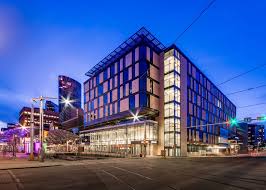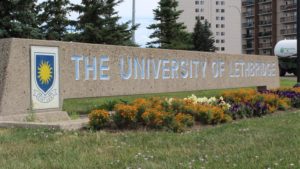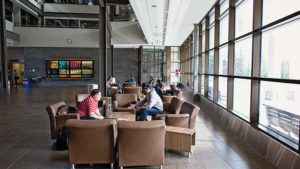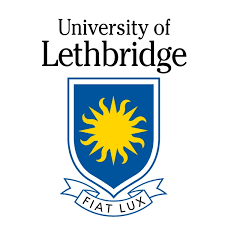University of Lethbridge

University of Lethbridge
Location: Lethbridge, Alberta, Canada
Foundation Year: 1967
Type: Public
Tuition Fees: 17,526 CAD per year
The University of Lethbridge or uLethbridge was founded in 1967 on traditional Blackfoot territories. Today it is one of the top-ranked universities in Canada and the leading research institution. Recently, RE$EARCH Infosource Inc. has ranked uLethbridge as one of the top three research universities in the undergraduate category in Canada, it also belongs to the top 6% worldwide in research performance. “Let there be light” is the official motto of the University, stating that true illumination comes from research and learning.
The University boasts campuses in Lethbridge and Calgary, and it’s Centre for Financial Market Research and Teaching is the best-equipped academic trading room in Western Canada. In 2019, Canada’s most advanced facility for science education and research was opened here - the Science Commons. The University of Lethbridge is also known for its art collection that includes more than 16,000 pieces and is one of the most significant in the country.
In 2020 uLethbridge graduate enrolment reached a record-breaking 753 students. It is worth mentioning, that all students are encouraged to participate in various important scientific events in Canada, and all over the world - more than 70 percent of the graduate students in thesis-based programs present at conferences or meetings in their field of research, and more than a half of doctoral students co-author papers in peer-reviewed journals.
The University of Lethbridge fosters the scholarly development of its researchers. One of the main goals of the institution is to provide students and postdoctoral fellows with an educational experience that is enhanced by experiential learning opportunities and high-quality equipment. Advanced mentorship and career development are additional benefits of the uLethbridge academic environment.

University is proud of its globally-recognized research portfolios and supports emerging areas of research excellence and collaborations. A number of research centers and institutes facilitate partnerships and help to attract alternate sources of funding for teaching, and research, and to prepare the next generation of scientists and practitioners in the best scientific atmosphere. The research topics covered include Applied Life Sciences, Community Health, Knowledge, Culture, and Society, Earth-Space Exploration and Sustainable Development, and Globalization.
Undergraduate students, interested in research, can try to get additional funding from the Alberta Innovates Summer Research Studentships. They offer applicants with exceptional academic records an opportunity to participate in medical or health-related research at the University during the summer. Another option is to try the Chinook Summer Research Awards. They provide students of all programs with a research training experience under the supervision of the University of Lethbridge faculty member. The NSERC Undergraduate Student Research Awards support the research in Natural Sciences and Engineering. The awards encourage students to undertake graduate studies and pursue a research career at uLethbridge. Funding for graduate students is available through the School of Graduate Studies and includes more than fifty research grants.
The University of Lethbridge consists of seven faculties and schools: the Faculty of Arts and Science, the Faculty of Education, the Faculty of Fine Arts, the Faculty of Health Sciences, and the Dillon School of Business, the School of Liberal Education, and the School of Graduate Studies.

More than 150 Undergraduate programs are available for a choice at Lethbridge and Calgary campuses. The areas covered include Agricultural Biotechnology, Agricultural Studies, Anthropology, Applied Statistics, Archeology and Geography, Biochemistry, Biological Sciences, Canadian Studies, Chemistry, Computer Science, Computer Science and Geographical Information Science, Dentistry, Economics, Environmental Science, English, Engineering, French and Spanish, General Major in Humanities, or in the Sciences, General Major in the Social Sciences, Geography, History, Kinesiology, Journalism, Indigenous Studies, Mathematics, Law Transfer programs and Medicine Transfer programs, Philosophy, Physics, Political Science, Psychology, Remote Sensing, Religious Studies, Social Work, Urban and Regional Studies, Sociology, Accounting, Women and Gender Studies, Agricultural Enterprise Management, Marketing, International Management, Human Resource Management, and Human Relations, Art Education, Career and Technology Studies, Drama Education, English Language Arts Education, Mathematics Education, Modern Languages Education, Music Education, Native Education, Physical Education, Science Education, Social Studies Education, Art, Art History and Museum Studies, Digital Audio Arts, Dramatic Arts, Indigenous Art, Music, New Media, Performance, Technical Design, Aboriginal Health, Addiction Counselling, Nursing, Therapeutic Rectreation and Public Health.
Graduate Studies at the University of Lethbridge include the Doctor of Philosophy, Graduate Certificate or Diploma, Master of Arts, Master of Counseling, Master of Education, Master of Fine Arts, Master of Health Services Management, Master of Nursing, Master of Music, Master of Science, Master of Science in Health Sciences, Master of Science in Management programs.
The English for Academic Purposes program at the University of Lethbridge is approved by Languages Canada as an intensive English program. Its aim is not only to help students to meet the English Language Proficiency requirement of the University but also to provide them with the skills necessary to succeed in an academic English environment in Canada and other countries of the world. During the program, students develop academic communication skills; academic reading and writing techniques; library research and information gathering skills; study skills for success in university academics. They are also introduced to interdisciplinary knowledge and are taught how to bridge cultures.
The uLethbridge English for Academic Purposes program has four levels: pre-intermediate, intermediate, high intermediate, and advanced with a duration of one semester each. The start dates of the program are January, May, and September, and the applicant`s level is determined after the placement test. It is worth mentioning, that each level of English for Academic Purposes consists of Writing, Reading, and Communication courses. The program is only available on the Lethbridge campus. The University is also proud of its network of International Student Advisors who assist newcomers in adapting to campus life and smooth their immersion in Canadian culture.
The University of Lethbridge provides students with residences, that guarantee accommodation steps away from classes and professors’ offices, various student services, and social, exercise, and recreational spaces, including study rooms and academic programming. It is worth mentioning, that residents belong to the largest student club on campus, known as the Organization of Residence Students, which provides support and plans fun activities, coordinates social events, educational opportunities, and everyday interactions.
Admission Requirements to the University of Lethbridge vary depending on a chosen program and the educational history of an applicant. A satisfactory score on a standardized English test like TOEFL, IELTS, PTE, CAEL, CAE, CPE, MELAB, or the University of Lethbridge English for Academic Purposes Program is obligatory.
The average international student Tuition Fee at uLethbridge is based on a typical course load for one-year, which includes five courses per semester or ten courses over the academic year and is 17,526 CAD.
Regards,
International Experience Club

